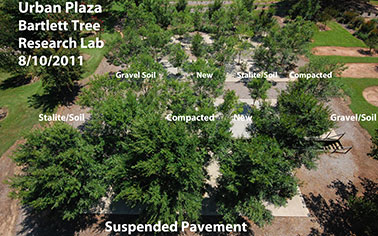Urban areas can often be completely covered by one hardscape surface or another – which when not considered properly can mean a nonexistent presence of trees in cityscapes. Given the enormous social and environmental benefits of trees, urban landscape professionals should consider methods suitable for planting trees in urban areas. Suspended pavement over noncompacted soil is a construction technique that has been recommended worldwide for urban development projects. Suspended hardscapes provide the best available tree growth, according the Dr Thomas Smiley, an arboriculture researcher at Bartlett Tree Experts. Research at the urban plaza experimental plot at Bartlett Laboratories in Charlotte, North Carolina compared soil treatments under pavement to determine which one provided a suitable rooting environment for urban tree plantings. Suspended hardscapes is a treatment that is sometimes overlooked by landscape architects when designing urban tree sites. “Trees in the suspended pavement treatment were larger and faster-growing than most of the other treatments, and had better colour and more root growth,” Dr Smiley said in his findings.
The suspended hardscape is supported at the surface by structural support modules commonly known as soil cells. GreenBlue’s StrataCell® system has quickly become the most sought-after suspended concrete system for tree pit use in urban development projects. StrataCells are world-renowned structural soil modules which can be assembled to form a skeletal matrix that supports sidewalk and traffic loads. The structural integrity of the StrataCell system supports the concrete above, while preventing tree roots from getting out of the cell zone and interfering with utilities and other services.
The StrataCells allow for an increased volume of appropriate soil blend rather than structural soil which is unsuitable for tree planting because of the containment of rocks and debris and the fact that it is compacted.

The most limiting factor in the growth of urban trees is the lack of usable soil for root growth. With the suspended pavement technique, nearly all of the soil under the sidewalk is usable for root growth. As a matter of fact, suspended pavement over the StrataCell system features almost five times more available growing space than traditional structural soil method, therefore facilitating much healthier root growth. “The system allows trees the opportunity to grow to their mature size in a harsh urban environment.”
Dr Smiley’s study proved that structural soil only contains about 20% soil by volume, affecting water and nutrient availability over the lifetime of the tree. Compare that to the StrataCell’s interconnected skeletal matrix which provides over 94% void space for filling with optimal soil media or stormwater detention.
Structural support modules also allow for a variety of surfaces to be applied over the top, such as paving stones and asphalt, not just concrete. The Bartlett Tree Experts study also proved that noncompacted soil with suspended concrete was easy to install – a fact commonly repeated regarding the StrataCell system.

If suspended concrete is to be used for urban development projects, it will need to be engineered to take expected loads without breaking. Numerous laboratory tests have proven that the structural integrity of the StrataCell system is unrivaled. Here in North America, we demonstrated that it can sustain the weight of an ASV PT-50 multi-terrain loader. An assembled StrataCell system has been FEA tested to 550 kPa vertical load. The system’s interlocking feature provides correct dispersion of wheel loads throughout the matrix, therefore featuring extremely high compressive strength. Due to this structural integrity, the modules can even be used under trafficked areas.
In a more recent study entitled “Growing Trees Near Concrete”, Dr Smiley reiterates that suspended pavement is still associated with healthier tree growth, and sidewalk damage doesn’t does not occur. Suspended sidewalk over noncompacted soil provides a good, long-lasting alternative for growing large trees in urban areas.
Aside from the StrataCell’s high strength capacity, the modules are also recyclable and are manufactured from 100% recycled polymer. And because there are no steel components, the modules are also completely corrosion free.

